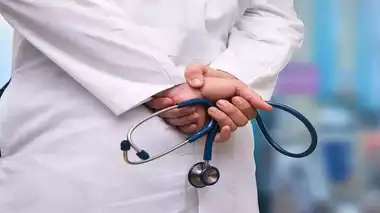
New Delhi: The National Health Commission’s (NMC) established, National Task Force for Mental Health and Wellbeing to survey the mental health of medicos has revealed shocking results. The survey report says that one in four MBBS students has a mental disorder, while one in three postgraduate medical students experiences suicidal thoughts. The task force conducted an online survey from 26 April to 6 May, involving 25,590 undergraduate students, 5,337 postgraduate students, and 7,035 faculty members.
The survey report said “Online survey results were consistent with the global literature, an alarmingly high 27.8 percent of UG students and 15.3 percent of PG students voluntarily reported having a diagnosed mental health disorder.” Furthermore, 16.2 percent of UG students and 31.2 percent of PG students reported experiencing suicidal ideation. Additionally, 564 PG students (10.57 percent) indicated making plans to attempt suicide within the last year, and 237 PG students (4.44 percent) admitted to attempting suicide in the past year. The report suggested for urgent intervention and said “This level of mental health disorders and suicidal ideation, combined with students’ risk factors, demands urgent and aggressive implementation of intervention programs.” On the other hand the survey says that the faculty believe that 51.76 percent of students might use mental stress as an excuse, while 48.17 percent consider these issues genuine and not merely excuses.
READ ALSO : CJI D Y Chandrachud inaugurates Ayush Holistic Wellness Centre at premises of Supreme Court of India
The report also noted that thoughts of self-harm or suicide in the past 12 months were reported by 4,139 MBBS students (16.2 percent), with 1,305 students (5.1 percent) seeking professional help. A large number of medicos do not seek mental health support. The survey report gives the statistics “Comfort in seeking professional mental health support varies, with 3,426 students (13.4 percent) feeling very comfortable, 6,106 (23.9 percent) somewhat comfortable, 10,696 (41.8 percent) neutral, and 5,362 (21 percent) somewhat or very uncomfortable.” Regarding adequate knowledge and skills for managing stress, 9,319 students (36.4 percent) reported feeling that they lacked the necessary knowledge and skills. “Faculty or mentors are perceived as extremely unsupportive by 4,664 students (18.2 percent),” the report added. On the issue of seeking support during stress, 3,139 students (12.3 percent) feel somewhat or very uncomfortable seeking help from parents or family, while 3,339 (13 percent) feel the same seeking support from friends or peers, and and 7,693 (31.1 percent) from faculty or mentors.
The condition is more complicated in the postgraduate medical students. Nearly half of PG students who participated in the survey (2,432 or 45 percent) reported working more than 60 hours a week, with over 3,020 (56 percent) not receiving their weekly days off. 42 percent of PG students attributed their stress to issues related to college administration, including interactions with patients and their families. The remaining 50 percent cited faculty and seniors as the primary sources of their stress, equally divided between the two. A significant portion of PG students (26 percent) expressed dissatisfaction with regular teacher attendance, while 17 percent reported inadequate support from their guides during their thesis work, highlighting the need for improvements in educational standards and student support. About half of the PG students (2,747 or 51.5 percent) reported stress due to the PG seat leaving bond, indicating a potential area for policy adjustments. Additionally, nearly 37.4 percent (1,998) of PG students reported stress related to the rural service bond, affecting a substantial number. Among the 5,337 students surveyed, 680 (12.7 percent) reported being asked for unreasonable favours in exchange for passing exams. The report stated, “Even the 12.7 percent of students reporting such demands can severely undermine the integrity of educational institutions and harm the overall educational experience. These practices may also have long-term detrimental effects on the professional and ethical standards of future medical practitioners.” “This issue underscores the need for stringent policies, transparent grievance mechanisms, and robust anti-corruption measures within academic institutions. It is crucial that students feel supported in reporting these issues without fear of repercussions,” the report added.
While institutional cases of ragging rarely come to public attention, the survey by the task force revealed that 2,486 of the surveyed MBBS students (9.7 percent) confirmed having such experiences, while 3,449 students (13.5 percent) preferred not to discuss ragging. “Regarding institutional measures, 17,932 students (70.1 percent) believe their college has adequate measures to prevent and address ragging, while 3,618 students (14.1 percent) disagree, and 4,040 students (15.8 percent) are unsure,” the report stated. Among the 5,337 PG students surveyed, a significant number—930 students (18 percent)—reported that ragging is still prevalent and has adversely affected them, highlighting the ongoing issue within some academic environments. Additionally, 1,425 PG students (27 percent) reported experiencing harassment from senior PG students in clinical settings, while 1,669 students (31 percent) reported similar experiences from faculty and senior residents.
As far as the hostel is concern, a significant portion of MBBS students, 10,645 (41.6 percent), are very or moderately dissatisfied with the overall condition of their hostel facilities, including cleanliness and maintenance. Regarding the privacy and personal space within hostel rooms, 8,613 students (33.7 percent) feel they do not have adequate privacy. The quality of food provided in the hostel mess is also a major concern, with 14,294 students (55.9 percent) expressing dissatisfaction. “Given the individualized nature of mental health issues and suicidality, a one-size-fits-all solution for suicide prevention is impractical. Addressing this complex challenge requires a sophisticated, multi-faceted approach tailored to meet the unique needs and circumstances of medical students in India,” the report emphasized.